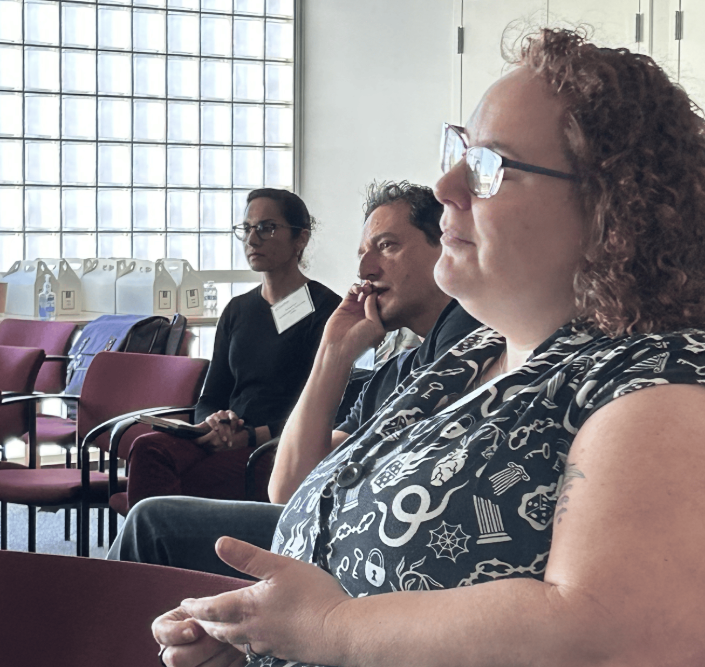UC San Diego Hosts Hands-On Workshop for Researchers Interested in Advocating on Capitol Hill
Story by:
Published Date
Article Content
A group of UC San Diego researchers and staff gathered for one of the first events in an Office of Research and Innovation series designed to help researchers on campus advance their work. The Compelling Science Advocacy and Communication with Policymakers and Funders event was hosted in conjunction with the Research Communications Program.
The workshop focused on equipping scientists with tools and strategies necessary to effectively advocate for their research and communicate with those who can influence funding and policy decisions in Washington, D.C
“The aim of the workshop and the upcoming series of research leadership activities held in conjunction with our federal relations team is to leverage the amazing expertise we have on campus to help researchers make an impactful connection to the interests and needs of the policymakers and funding agencies that they have the opportunity to meet with,” said Vice Chancellor for Research and Innovation Corinne Peek-Asa. “We want to provide the resources to make our research community leaders more confident, knowledgeable, and motivated about conveying that to our elected officials and their representatives.”
The session kicked off with a compelling case study from Natalie Alpert, Executive Director for Federal Government and Research Relations, and Christian Dameff, Assistant Professor of Emergency Medicine and co-director of the Center for Healthcare Cybersecurity.
Their discussion centered on Dameff’s experience advocating for funding from the Advanced Research Projects Agency for Health (ARPA-H), offering valuable insights into the dynamics of federal funding and the importance of concise, impactful communication.
Dameff said that it pays to take every opportunity to discuss the importance and power of research with legislative officials, but he warned attendees that they won’t get much time to do that so honing their message is crucial.
“Being aware of the perspective of legislators is extremely important. It’s not just the partisan aspect, it helps to know where the legislator is in the budget cycle, is it near a mid-term election, or right after, is their district heavily rural and can you speak to that,” Dameff said.
Alpert, who is based in D.C. said that her office will guide researchers with answers to all of those questions so that researchers speaking before Congressional staffers can better calibrate their messages.
Getting To the Heart
Participants were guided through The Spark: Your Research Super Objective by Kim Rubinstein, Professor Emeritus of Theater and Dance, and Debbie Meyer, Science Communications Consultant.
The aim of the workshop and the upcoming series of research leadership activities held in conjunction with our federal relations team is to leverage the amazing expertise we have on campus to help researchers make an impactful connection to the interests and needs of the policymakers and funding agencies that they have the opportunity to meet with.

The session helped attendees reconnect with the foundational spark that drives their research.
Some researchers recalled childhood curiosity that inspired them to pursue solutions, including being confused by an image of poverty, being perplexed about a malfunctioning appliance and being overwhelmed about a medical crisis.
To refine the core message of their work, Rubinstein said researchers should tap into the emotional and intellectual passion that makes their research compelling, both to their peers and to policymakers. She said it’s not a motivation that they have to share, but holding that “super objective” in mind can make it easier to speak from the heart, not just the head, in conveying the importance of their work.
The Pitch
The final session, The Pitch: Structuring Your Research Story, was led by Sherry Seethaler, author of “Beyond the Sage on the Stage,” and Mario Aguilera, Director of Communications for the School of Biological Sciences. Together, they helped attendees address their storytelling skills, offering strategies to distill complex research into a clear, persuasive narrative. The focus was on creating a story that conveys the science and also resonates on a personal level that might be better suited to motivate action and support.
Throughout the event, attendees were encouraged to refine their communication strategies and think critically about how to position their research in a way that aligns with the priorities of those who can make a difference in funding and policy. The intimate setting and interactive sessions made for a productive and collaborative environment, allowing for meaningful discussions and exchange of ideas.
The workshop is part of a series of upcoming research leadership events designed to elevate the stature of scientific innovators on campus who are driving progress in diverse fields.
Attendees were also encouraged to contact Alpert in federal relations to test out their new skills by connecting with her to arrange in-person meetings with Congressional staffers to tell their research stories and provide better context to how UC San Diego fits into the landscape of federal funding.
Resources
Natalie Alpert in Federal Government and Research Relations is also available to anyone on campus interested arranging meetings with Congressional staffers or legislators. Alpert can be reached at nalpert@ucsd.edu.
For more information on the research leadership initiative contact Lisa Trahan at vcri-initiatives@ucsd.edu with questions about upcoming leadership development or strategic internal funding opportunities.
- Register for Building a Diversified Research Funding Portfolio on February 25 from 1:00 – 2:30 p.m. (virtual)
- Apply for Convene and Influence Awards to fund the initial stages of interdisciplinary projects and related activities aimed at advancing thought leadership on the University's updated strategic plan research themes.
UC San Diego faculty and postdoctoral scholars can learn more about the Research Communications Program and sign up for presentation coaching sessions and interactive workshops to practice communicating research to key audiences by contacting Mario Aguilera at maguilera@ucsd.edu.
Share This:
Stay in the Know
Keep up with all the latest from UC San Diego. Subscribe to the newsletter today.




